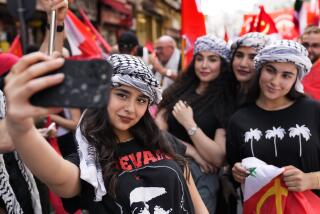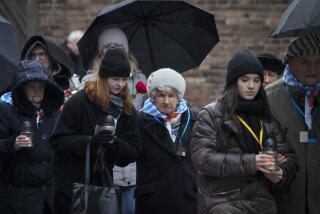Workers Unite, Challenge Authority on May Day
- Share via
May Day observances around the world Tuesday reflected the democracy campaigns that have swept the Communist world and challenged its leadership, a stark contrast to the party-line celebrations of a year ago.
In East Germany, thousands of workers spent their first free May Day protesting the widespread joblessness they fear will be the price of unification with West Germany.
Nearly 60,000 Germans from both sides of the border crowded around the Reichstag, the former Parliament building on the West German side of the Berlin Wall. They heard speakers demand employment and social service protection as East Germany moves from a Communist economy to the free market.
In the troubled Kreuzberg district of West Berlin, the first May Day observance in 44 years was marred by battles between police and more than 500 youths.
Police in riot gear used water cannons and tear gas in a frustrated bid to control the mob that raged through Kreuzberg after nightfall, smashing shop windows, torching buildings and police cars and barricading streets. Fifty people were arrested.
The violence erupted at the close of a May Day rock concert attended by 15,000 people in Kreuzberg, a working-class neighborhood adjacent to the Berlin Wall that is the haunt of Turkish immigrants, punk rockers and a variety of leftists and anarchists.
Some Eastern Europeans, accustomed to being herded into streets and stadiums for Communist-sponsored May Day ceremonies, were delighted this year simply to be left alone.
“Romanians are very tired,” said Mihai Radu, 28, an official tour guide in Bucharest. “We don’t know the feeling of going out on the streets of our own free will. We only know what it is like to be pushed.”
In Prague, Czechoslovakia, where the short-lived joy of the “Prague Spring” reforms produced a raucous May Day parade in 1968, crowds gathered to welcome back U.S. activist Allen Ginsberg, crowned unofficial king of the festivities 22 years ago but then expelled by the Communists.
Remnants of Czechoslovakia’s Communist Party threw a very non-traditional May Day bash. Polkas blared from loudspeakers, and volunteers dished out free goulash and beer and sold raffle tickets to fill the party’s coffers in advance of the June elections.
“We came because they give us free beer,” admitted one of the revelers, 26-year-old mechanic Raymon Biel.
In contrast to more subdued parades in Eastern Europe, Cuba’s May Day celebration was the most spectacular in the Western Hemisphere and among the biggest in the world. Three million workers participated in mass marches billed by the government as a show of support for President Fidel Castro and the island’s Communist system.
In Beijing, an armed police cordon around Tian An Men Square’s monument to revolutionary heroes reflected official determination to avoid any repeat of the pro-democracy demonstrations of last spring.
May Day violence was reported in Turkey, where celebrations of the labor holiday have been banned since 1980. More than 1,000 were arrested there for joining illegal marches, and at least nine people were injured in clashes with security forces.
In Managua, Nicaragua, leftist Sandinistas and backers of Nicaragua’s new government hurled stones at each other when their separate May Day marches crossed paths, witnesses said.
In Mexico City, riot police on foot and horseback charged a march near the center of the capital with clubs, leaving several demonstrators with bleeding head wounds.
And in Tegucigalpa, Honduras, about 20,000 public workers used a May Day march to protest a rigid economic austerity plan that they say threatens public sector jobs.
More to Read
Sign up for Essential California
The most important California stories and recommendations in your inbox every morning.
You may occasionally receive promotional content from the Los Angeles Times.













